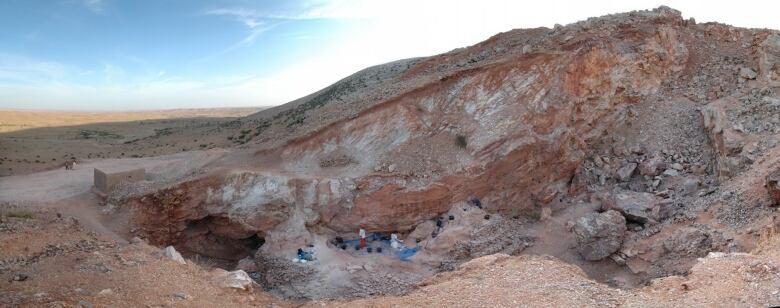New fossil discovery changes human origin story

Where do we come from?
A recent finding has us one step closer to answering that age-old question.
A team of archeologists have discovered Homo sapiens fossils in Morocco believed to be 300,000 years old —100,000 years earlier than fossils found in East Africa.
This discovery pushes back the origin of our species by more than 100,000 years and challenges the notion that the cradle of civilization might not have been in East Africa, but all of Africa.
Shannon McPherron, a paleolithic archeologist, was a member of the team that made the discovery that he calls "the first example of our species."
"They look just like us ... The face falls into the range of variability of people we see today," he tells The Current's guest host Jan Wong.
If you put a hat on this individual, they would probably pass.- Shannon McPherron, paleolithic archeologist
McPherron says the key differences between those individuals and today's humans were the braincases. The Homo sapiens of that time had elongated braincases, as opposed to the high and rounded ones humans have today.

While this discovery is considered a breakthrough, McPherron says there is genetic evidence that the origins of humans goes back further, "probably half a million years ago somewhere in Africa."
"So at some level it wasn't surprising to find something older, but it's been quite difficult. It's been difficult to find fossils from well-dated sites," he explains.
"So this was really a breakthrough to get additional material that sort of shed light on how our features came to be."
We really want to know how rare is life as a natural phenomenon.- Jim Cleaves, chemistry professor
According to chemistry professor Jim Cleaves, the scientific benefit of understanding the origins of life "certainly speaks to our place in the universe," which is why humans are interested in finding out about life on other planets in the solar system.
"We really want to know how rare is life as a natural phenomenon," he says.
Cleaves says our fascination with our origins had led to scientific breakthroughs, like the recent discovery made by McPherron's team.
"There's been a remarkable reshaping of our conception, of how old the universe is, how old the planet is, how old life is, how old humanity is over the last few hundred years of scientific discovery," he says.
"The picture is getting clearer and clearer in the last few decades."
Listen to this segment at the top of the web post.
This segment was produced by Willow Smith.